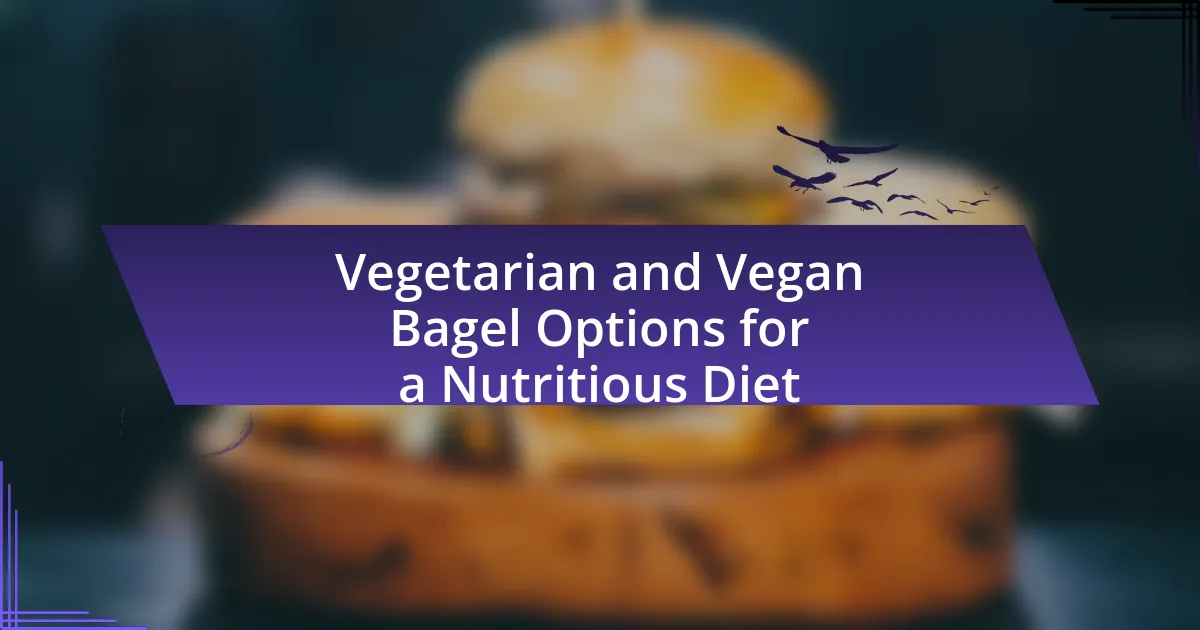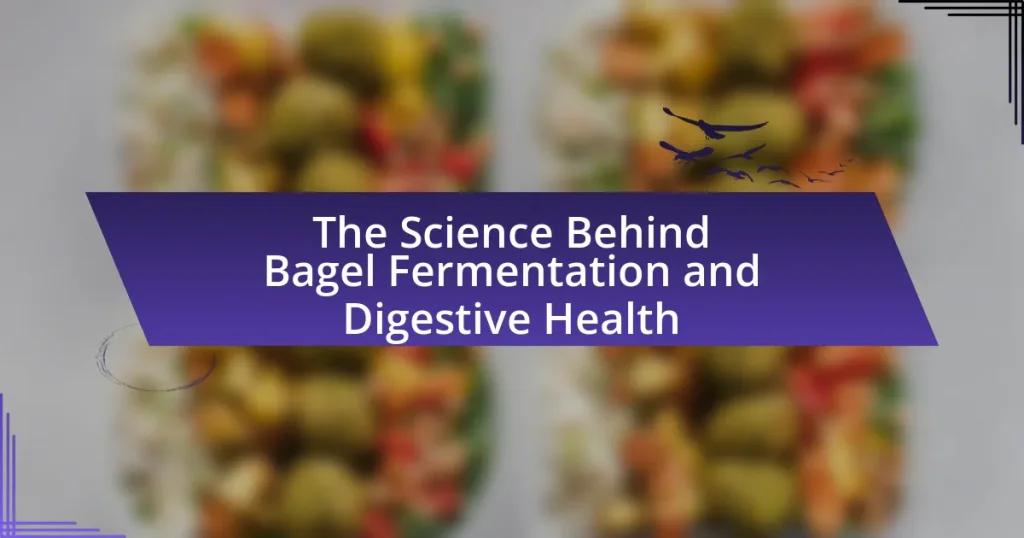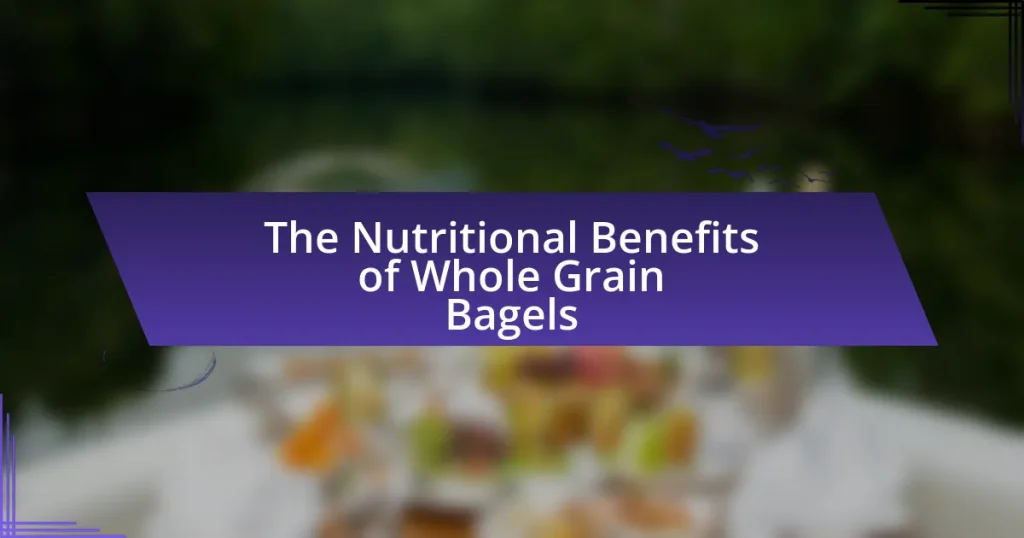Vegetarian and vegan bagel options are increasingly popular choices for those seeking nutritious diets, as they are made without animal products and can be topped with a variety of plant-based spreads. These bagels differ from traditional varieties primarily in their ingredients, often utilizing alternatives like almond milk or aquafaba instead of dairy. The article explores common ingredients and nutritional benefits of vegetarian and vegan bagels, highlighting their role in promoting digestive health and reducing the risk of chronic diseases. Additionally, it provides meal ideas and tips for selecting high-quality bagels, emphasizing the importance of whole grains and natural ingredients for optimal health.
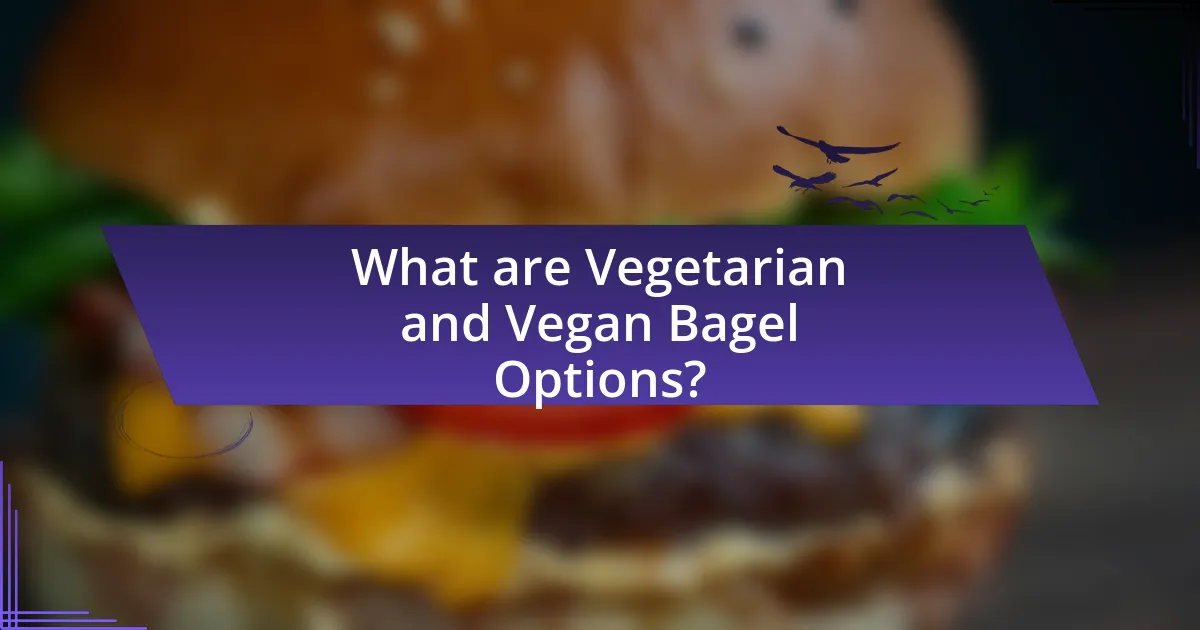
What are Vegetarian and Vegan Bagel Options?
Vegetarian and vegan bagel options include bagels made without animal products, such as plain, whole wheat, and everything bagels, which can be topped with various plant-based spreads like hummus, avocado, or vegan cream cheese. These options cater to dietary preferences while providing essential nutrients. For instance, whole wheat bagels offer more fiber compared to their white counterparts, contributing to better digestive health. Additionally, toppings like avocado provide healthy fats, while hummus adds protein, making these bagels a nutritious choice for vegetarians and vegans.
How do vegetarian and vegan bagels differ from traditional bagels?
Vegetarian and vegan bagels differ from traditional bagels primarily in their ingredients, specifically the absence of animal products. Traditional bagels typically contain ingredients like honey or dairy, while vegetarian bagels may include dairy but exclude meat, and vegan bagels are entirely free from animal-derived ingredients. For example, traditional bagels may use milk or eggs in the dough, whereas vegan bagels utilize plant-based alternatives such as almond milk or aquafaba, ensuring they align with a vegan diet. This distinction is crucial for individuals adhering to vegetarian or vegan lifestyles, as it directly impacts their dietary choices and nutritional intake.
What ingredients are commonly used in vegetarian bagels?
Common ingredients used in vegetarian bagels include various types of flour, water, yeast, salt, and sugar. Additionally, toppings and fillings such as cream cheese, avocado, hummus, vegetables (like tomatoes, cucumbers, and spinach), and herbs are frequently added to enhance flavor and nutrition. These ingredients provide a balanced combination of carbohydrates, proteins, and healthy fats, making vegetarian bagels a nutritious option.
What ingredients are commonly used in vegan bagels?
Vegan bagels commonly use ingredients such as flour, water, yeast, salt, and sweeteners like agave syrup or maple syrup. These ingredients create a dough that is free from animal products, making it suitable for a vegan diet. The flour provides the base structure, while yeast acts as a leavening agent, allowing the bagels to rise. Salt enhances flavor, and sweeteners can help with browning during baking.
Why choose vegetarian or vegan bagels for a nutritious diet?
Choosing vegetarian or vegan bagels supports a nutritious diet due to their plant-based ingredients, which are often lower in saturated fats and cholesterol compared to traditional bagels. These bagels typically incorporate whole grains, seeds, and vegetables, providing essential nutrients such as fiber, vitamins, and minerals. Research indicates that diets rich in plant-based foods can reduce the risk of chronic diseases, including heart disease and diabetes, while promoting overall health. For instance, a study published in the Journal of the American College of Cardiology found that plant-based diets are associated with a lower risk of cardiovascular events. Thus, vegetarian or vegan bagels can be a beneficial choice for those seeking a healthier dietary option.
What nutritional benefits do vegetarian bagels provide?
Vegetarian bagels provide a range of nutritional benefits, including dietary fiber, essential vitamins, and minerals. The whole grain varieties of vegetarian bagels are particularly high in fiber, which aids in digestion and helps maintain a healthy weight. Additionally, vegetarian bagels often contain B vitamins, such as folate and niacin, which are important for energy metabolism and overall health. They can also be enriched with iron and calcium, contributing to bone health and preventing anemia. Studies indicate that incorporating whole grains into the diet can reduce the risk of chronic diseases, further supporting the health benefits of vegetarian bagels.
What nutritional benefits do vegan bagels provide?
Vegan bagels provide several nutritional benefits, including being low in saturated fat and cholesterol-free, which supports heart health. They are typically made from whole grains, offering dietary fiber that aids digestion and promotes satiety. Additionally, vegan bagels can be enriched with seeds or nuts, contributing essential fatty acids, protein, and various vitamins and minerals. For instance, whole grain bagels can contain up to 3 grams of fiber per serving, which is beneficial for maintaining healthy blood sugar levels and reducing the risk of chronic diseases.
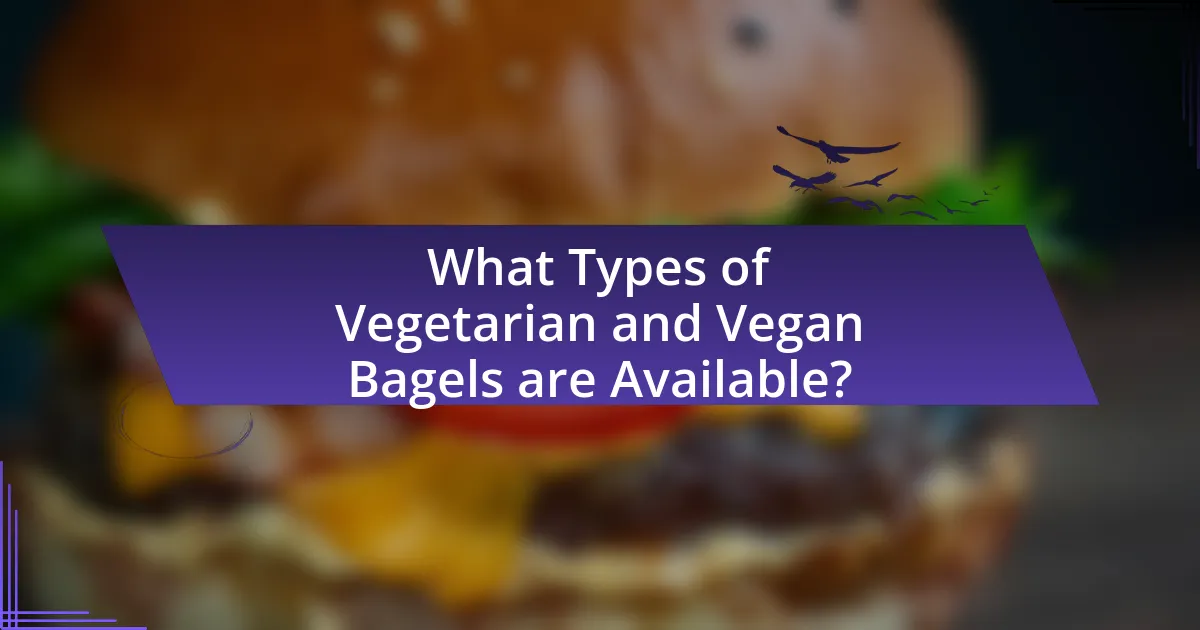
What Types of Vegetarian and Vegan Bagels are Available?
Vegetarian and vegan bagels include a variety of flavors and ingredients that cater to plant-based diets. Common types of vegetarian bagels are those made with ingredients like cheese, eggs, or dairy-based spreads, while vegan bagels are entirely free from animal products. Popular vegan options often feature flavors such as everything, sesame, poppy seed, and plain, made with plant-based ingredients. Additionally, specialty vegan bagels may incorporate ingredients like spinach, sun-dried tomatoes, or herbs for added flavor. The availability of these bagels can vary by bakery or store, but many now offer a selection to meet the growing demand for vegetarian and vegan diets.
What are popular vegetarian bagel toppings?
Popular vegetarian bagel toppings include cream cheese, avocado, hummus, cucumber, tomato, and various types of sprouts. Cream cheese is a classic choice, often paired with herbs or vegetables for added flavor. Avocado provides healthy fats and can be seasoned with salt and pepper or mixed with lime for a zesty twist. Hummus offers a protein-rich alternative and can be spread on its own or topped with vegetables like cucumber and tomato. Sprouts, such as alfalfa or radish, add crunch and nutrition, making them a favored topping among vegetarians. These toppings are widely recognized for their taste and nutritional benefits, making them staples in vegetarian diets.
How can cream cheese alternatives enhance vegetarian bagels?
Cream cheese alternatives can enhance vegetarian bagels by providing diverse flavors and textures while catering to dietary preferences. These alternatives, such as nut-based spreads, tofu-based creams, or plant-based yogurts, offer a creamy consistency similar to traditional cream cheese but often contain healthier ingredients, such as nuts, seeds, or probiotics. For instance, almond cream cheese is rich in healthy fats and protein, contributing to a more nutritious meal. Additionally, these alternatives can be flavored with herbs, spices, or fruits, allowing for a customizable experience that can elevate the overall taste profile of vegetarian bagels. This versatility not only satisfies various dietary needs but also encourages creativity in meal preparation, making vegetarian bagels more appealing and enjoyable.
What vegetables work best as toppings for vegetarian bagels?
Cucumbers, tomatoes, red onions, and avocados work best as toppings for vegetarian bagels. Cucumbers add a refreshing crunch, while tomatoes provide juiciness and flavor. Red onions contribute a sharp taste that complements other ingredients, and avocados offer creaminess and healthy fats. These vegetables not only enhance the taste but also increase the nutritional value of the bagel, making them ideal choices for a nutritious vegetarian diet.
What are popular vegan bagel toppings?
Popular vegan bagel toppings include avocado, hummus, nut butters, vegan cream cheese, and fresh vegetables like tomatoes, cucumbers, and sprouts. Avocado provides healthy fats and a creamy texture, while hummus adds protein and flavor. Nut butters, such as almond or peanut butter, offer a rich taste and additional nutrients. Vegan cream cheese alternatives are widely available and mimic traditional cream cheese, making them a popular choice. Fresh vegetables enhance the nutritional profile and add crunch, making these toppings both delicious and healthful.
How can nut butters be used on vegan bagels?
Nut butters can be spread directly onto vegan bagels to enhance flavor and provide nutritional benefits. Common nut butters, such as almond, peanut, or cashew, offer healthy fats, protein, and essential vitamins. For instance, almond butter contains vitamin E and magnesium, while peanut butter is rich in protein and niacin. Spreading nut butter on a toasted vegan bagel creates a satisfying and nutritious meal or snack option, aligning with a balanced vegan diet.
What are some creative spreads for vegan bagels?
Creative spreads for vegan bagels include hummus, avocado mash, and cashew cream cheese. Hummus, made from blended chickpeas, tahini, and lemon juice, provides a protein-rich option. Avocado mash, simply mashed avocado with lime and salt, offers healthy fats and a creamy texture. Cashew cream cheese, created by blending soaked cashews with nutritional yeast and lemon juice, serves as a dairy-free alternative that is rich in flavor and nutrients. These spreads not only enhance the taste of bagels but also contribute to a nutritious vegan diet.
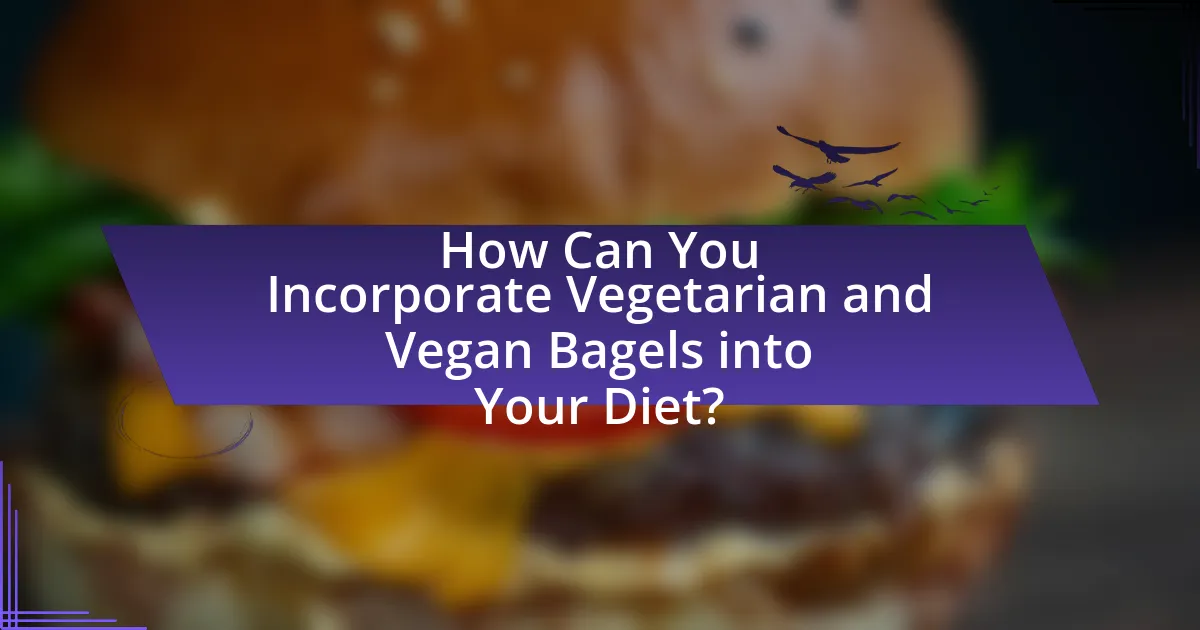
How Can You Incorporate Vegetarian and Vegan Bagels into Your Diet?
Incorporating vegetarian and vegan bagels into your diet can be achieved by using them as a base for nutritious toppings and fillings. For instance, you can spread hummus or avocado on a whole grain vegan bagel, adding vegetables like spinach, tomatoes, or cucumbers for extra nutrients. Additionally, using bagels as a substitute for bread in sandwiches allows for diverse fillings such as roasted vegetables, plant-based proteins, or vegan cheeses. Research indicates that whole grain options provide more fiber and essential nutrients, making them a healthier choice. By selecting bagels made from whole grains and pairing them with nutrient-dense toppings, you can effectively enhance your diet with vegetarian and vegan options.
What are some meal ideas featuring vegetarian and vegan bagels?
Vegetarian and vegan bagels can be creatively used in various meal ideas such as bagel sandwiches, bagel pizzas, and bagel salads. For instance, a bagel sandwich can be made with hummus, sliced cucumbers, and sprouts, providing a nutritious and filling option. Bagel pizzas can be prepared by topping a halved bagel with marinara sauce, vegan cheese, and vegetables like bell peppers and mushrooms, then baking until crispy. Additionally, a bagel salad can feature a toasted bagel cut into pieces, mixed with greens, cherry tomatoes, avocado, and a vinaigrette dressing, offering a fresh and satisfying meal. These ideas highlight the versatility of vegetarian and vegan bagels in creating nutritious meals.
How can bagels be used for breakfast options?
Bagels can be used for breakfast options by serving them with a variety of vegetarian and vegan toppings. Common choices include spreads like hummus, avocado, or nut butter, which provide healthy fats and protein. Additionally, bagels can be topped with fresh vegetables such as tomatoes, cucumbers, or spinach, enhancing their nutritional value. Research indicates that incorporating whole grain bagels into a diet can contribute to increased fiber intake, which is beneficial for digestive health.
What lunch ideas can include vegetarian and vegan bagels?
Vegetarian and vegan bagels can be used in various lunch ideas such as bagel sandwiches, bagel salads, and bagel spreads. For instance, a bagel sandwich can be made with hummus, sliced cucumbers, and sprouts, providing a nutritious and filling option. Additionally, a bagel salad can incorporate mixed greens, cherry tomatoes, and avocado, topped with a vinaigrette, offering a fresh and healthy meal. Bagel spreads, like avocado or vegan cream cheese, can also be paired with fresh vegetables or herbs for a quick and satisfying lunch. These options highlight the versatility of vegetarian and vegan bagels in creating nutritious meals.
What tips can help you choose the best vegetarian and vegan bagels?
To choose the best vegetarian and vegan bagels, prioritize bagels made with whole grains and natural ingredients. Whole grain bagels provide more fiber and nutrients compared to those made with refined flour, supporting better digestion and overall health. Additionally, check the ingredient list for additives; opt for bagels without artificial preservatives or flavors, as these can detract from the nutritional value. Look for bagels that are certified vegan to ensure they contain no animal products, which is essential for a vegan diet. Finally, consider the flavor options; many brands offer unique varieties that incorporate vegetables or seeds, enhancing both taste and nutrition.
How can you identify high-quality ingredients in bagels?
High-quality ingredients in bagels can be identified by examining the ingredient list for whole, natural components and the absence of artificial additives. Look for whole grain flours, such as whole wheat or spelt, which provide more nutrients and fiber compared to refined flours. Additionally, high-quality bagels often contain minimal ingredients, typically including water, yeast, salt, and natural sweeteners like honey or malt, rather than preservatives or artificial flavors. The presence of organic or non-GMO labels can also indicate higher quality. These factors contribute to a more nutritious and flavorful bagel, aligning with vegetarian and vegan dietary preferences.
What should you look for in nutritional labels for bagels?
When examining nutritional labels for bagels, focus on the serving size, calories, total carbohydrates, dietary fiber, protein, and sodium content. The serving size indicates how much of the bagel is considered one portion, which is crucial for understanding caloric intake. Calories provide insight into the energy content, while total carbohydrates inform about the energy source, with a higher fiber content being preferable for digestive health. Protein is essential for muscle repair and satiety, and lower sodium levels are important for heart health. For instance, a bagel with at least 3 grams of dietary fiber and 10 grams of protein is generally considered a healthier option.
